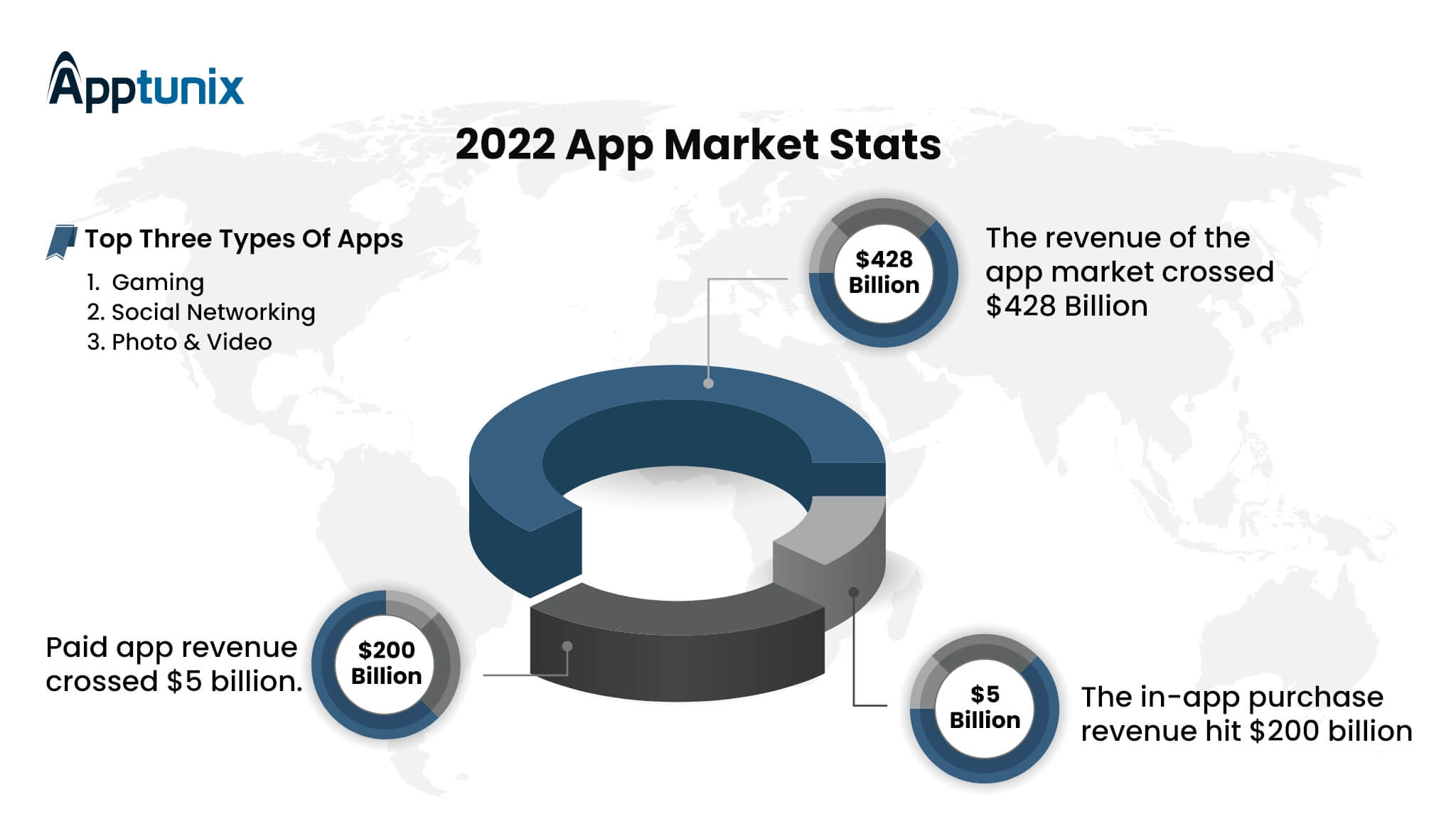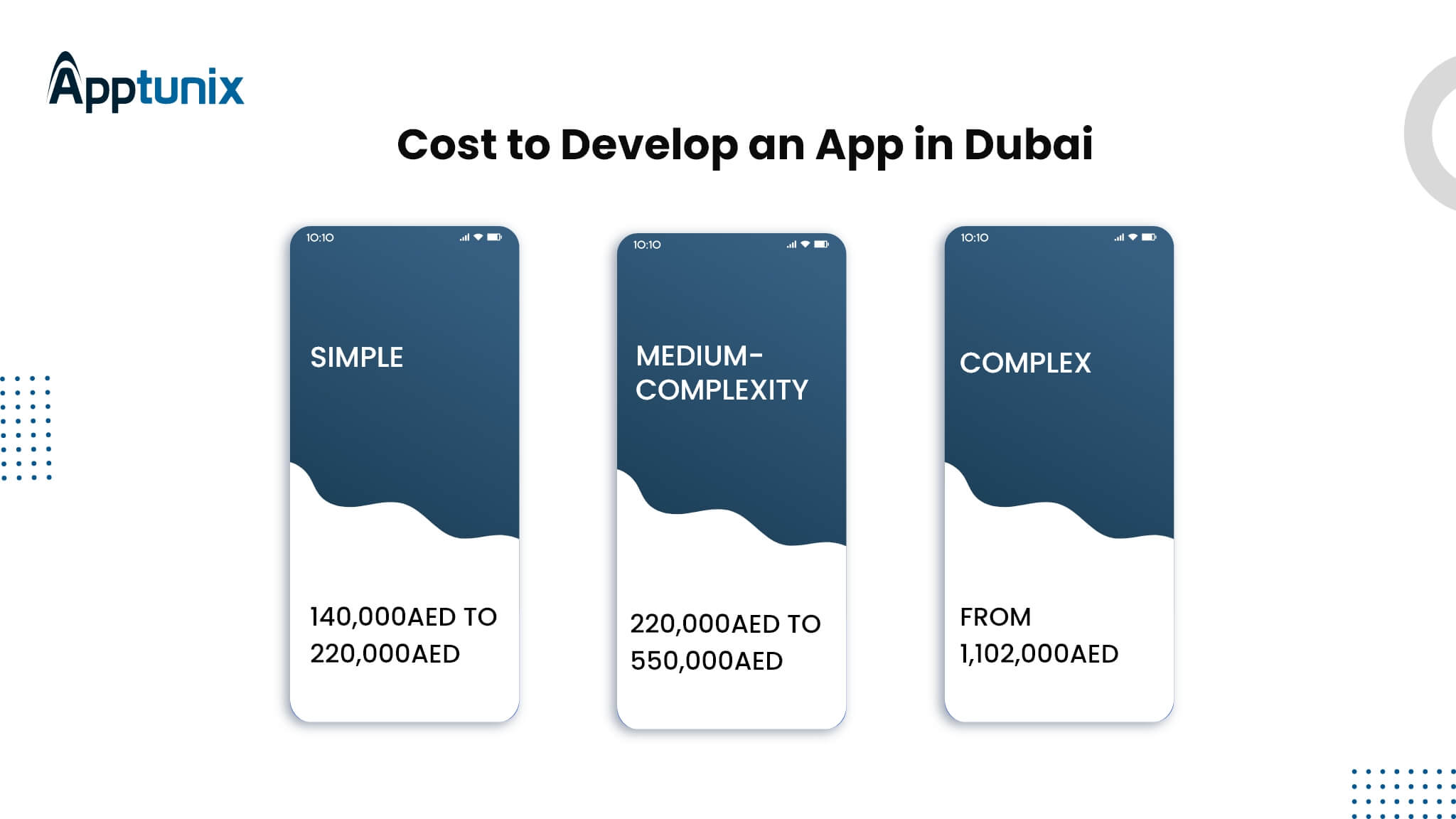Don't miss the chance to work with top 1% of developers.
Sign Up Now and Get FREE CTO-level Consultation.
Confused about your business model?
Request a FREE Business Plan.
How Much Does it Cost to Build an App in UAE (Dubai) in 2023?
Table of contents

Mobile app development is an art. Today, we have an app for almost anything, be it ordering food, watching movies and web series, being more physically active or learning to code. The mobile app market is already humongous. According to Statista, in 2022:

By the end of 2023, the total revenue generated by the app market will be almost $488 billion, which is expected to cross the $638 billion mark by 2027.
The moral of the story is that mobile app development is a lucrative business with hundreds of apps joining the app market every day. Hence, it is a great idea to start an app, but how much does it cost to develop an app in Dubai? Or elsewhere? Well, let’s find that out in this blog, but before that, let’s know how to develop a mobile app in Dubai or elsewhere.
How to Develop a Mobile App in Dubai?
Developing a mobile app is a long process. It goes through many phases, and each part of the mobile app development process is important. Here is a step-by-step explanation of the mobile app development process:

1.Decide a Business Idea
Starting a mobile app development project demands a solid business idea. Before proceeding further, you need to prepare all the documents required, which include an SRS document, technical specifications, details of resources required, and the proposed budget.
Your business idea must be developed and backed by analysing market trends and needs to ensure that the product you’re about to develop has a need in the market.
2.Choose the Development Methodology

There are several ways to develop software or a mobile app, but the two most popular methodologies that are used extensively today are agile and DevOps.
While agile focuses on introducing early and frequent testing to the product development process to segregate it into sprints, DevOps brings development and operations teams together.
Other than these two, waterfall and RAD, a.k.a. Rapid Application Development are also available. Each mobile app development method has its own set of merits and limitations.
Thus, you need to choose the methodology that best suits your mobile app development project requirements. Picking among the options available also depends on the type and scale of your project, the skillset of your in-house or outsourced team, and your budget.
3.Pick the Tech Stack
Choosing the technologies is a decision that can make or break your mobile app development project. There are multiple options available for doing these vital tasks of mobile app development:
- Frontend designing
- Backend development
- Database system
- Encryption/Security
- Payment gateways
You can either go for technologies that your development team is skilled at or you can choose to outsource a dedicated development team to work with technologies that you want to work with but don’t have a skilled workforce for.

4.Develop a Prototype or Minimum Viable Product
Sometimes businesses develop a product without analysing market requirements and user needs. This could lead to the disaster of developing a full-fledged product without any market demand. It simply means losing several thousand dollars.
To avoid such a scenario, some prefer to leverage either a prototype or minimum viable product or both. However, this is an optional phase that you might avoid when developing a small project.
Nonetheless, if you’re building a big project and looking to attract investors then you should definitely develop a prototype. It will also help in developing a minimum viable product.
Building an MVP will help you to start selling your services before finalising the product as well as to facilitate collecting invaluable user feedback.
Check out Common MVP Mistakes to Avoid
5.Code the App
The next step in the development of a mobile app is writing code. This depends on the technologies that you’ve finalised in the third step.
While Kotlin and Java are the leading options to code an app for Android, an iOS mobile app can be written using Swift or Objective-C. Other popular programming languages for writing mobile apps include Golang, C#, and JavaScript.
In addition to programming languages, other technologies and frameworks like React Native, Flutter, and Angular might also be used, especially when developing web apps.
6.Release the App
Once you’re done with finalising your mobile app, it’s time to launch it into the market. The release platforms depend on the platforms that you’ve targeted.
Releasing the app isn’t the last step though as now app maintenance kicks in, which accounts for the longest phase of the entire software development life cycle as it lasts through the entire lifetime of the mobile app.
App maintenance is often overlooked by businesses which can cost them huge losses. Adequate and proper maintenance measures must be taken to ensure that the app accommodates the latest trends in user preferences and tech.
How Much Does it Cost to Develop an App in Dubai?
To estimate the amount that you must require to build an app in Dubai, you must factor in all the different aspects of mobile app development. For example, a significant contributing factor is whether you have an in-house team or an outsourced development team.
Also, the complexity of the app, i.e., the number and type of features added to the app also contribute immensely to the overall development cost. Here is an estimate of app development cost in Dubai, depending on its complexity:

These are no fixed numbers and the cost might also vary depending on the location as different regions have different pay rates.
In essence, there are several factors that contribute to the development cost of a mobile app. The following table sums up the various parameters that decide the complexity of a mobile app:
A complex app can easily cost hundreds of thousands of dollars, while a mobile app with medium complexity will cost anywhere from a few thousand dollars to several thousand dollars. A basic mobile app can be realised by investing only a few thousand dollars.
Apptunix - The Best Mobile App Development Company in Dubai
Apptunix is an experienced mobile app development company that provides a galore of IT services to businesses of all sizes and shapes across the globe. We recently opened an office in Dubai to better our services in the Middle East.
We have been providing mobile app development and other services – website development, digital marketing, clone apps, and more – since 2013. Our team includes a wide diversity of app developers, web designers, marketing specialists, SEO experts, experienced writers, and more.
Conclusion
Developing a mobile app is an intricate process. The development process can make or break the app experience. Hence, you must be extra cautious while building an app.
Before starting to build something you must be confident that your business idea has a solid ground in research. Failures aren’t something that you can get rid of but you need to learn from your mistakes to form your (business idea’s) strengths.
You can either develop a mobile app on your own or hire an experienced mobile app development company in Dubai like Apptunix to help you with some or all aspects of app development.

Frequently Asked Questions(FAQs)
Q 1.How much does it cost to develop an app?
Developing an app can cost anywhere between $20000 to $300000 or more depending on the complexity of the app.
Q 2.How to develop an app?
Developing a mobile app requires deciding on a project idea and then doing the actual coding. You can do so with your own in-house team or outsource a dedicated development team.
Q 3.How much does it cost to build an app in Dubai?
The overall cost of developing a mobile app depends on the number of features and complexity of the app. In the UAE, it might vary from AED 140,000 to AED 220,000 for a basic app.
Rate this article!
(3 ratings, average: 5.00 out of 5)
Join 60,000+ Subscribers
Get the weekly updates on the newest brand stories, business models and technology right in your inbox.
Akhil has been writing content since 2014. Although he has written content across various niches, his forte is technology writing. Throughout his tenure he has worked in various capacities. He is presently working as the Marketing Manager for Apptunix.

App Monetization Strategies: How to Make Money From an App?
Your app can draw revenue in many ways. All you need to figure out is suitable strategies that best fit your content, your audience, and your needs. This eGuide will put light on the same.
Download Now!Subscribe to Unlock
Exclusive Business
Insights!
And we will send you a FREE eBook on Mastering Business Intelligence.

















